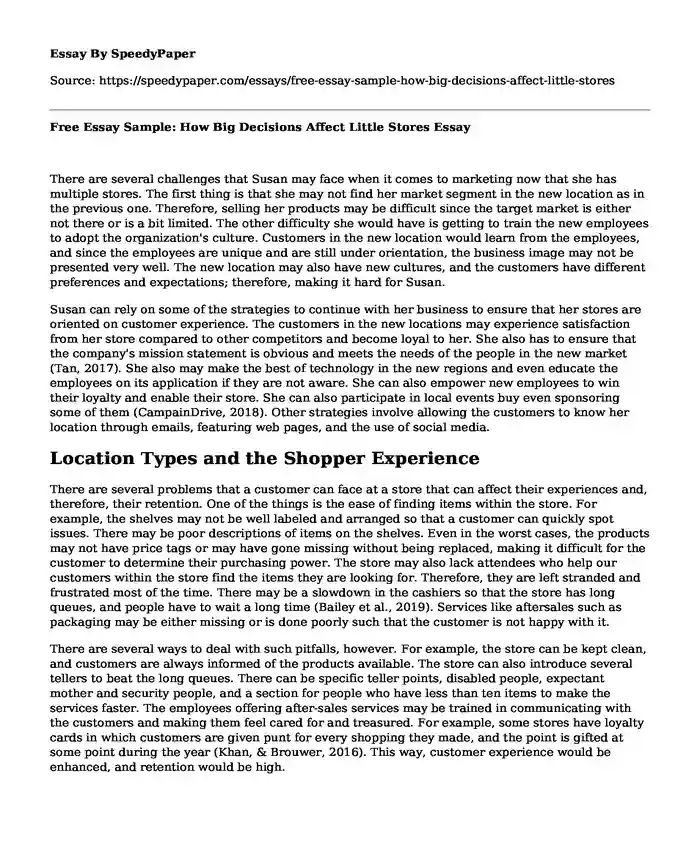
| Type of paper: | Essay |
| Categories: | Company Marketing Customer service |
| Pages: | 3 |
| Wordcount: | 681 words |
There are several challenges that Susan may face when it comes to marketing now that she has multiple stores. The first thing is that she may not find her market segment in the new location as in the previous one. Therefore, selling her products may be difficult since the target market is either not there or is a bit limited. The other difficulty she would have is getting to train the new employees to adopt the organization's culture. Customers in the new location would learn from the employees, and since the employees are unique and are still under orientation, the business image may not be presented very well. The new location may also have new cultures, and the customers have different preferences and expectations; therefore, making it hard for Susan.
Susan can rely on some of the strategies to continue with her business to ensure that her stores are oriented on customer experience. The customers in the new locations may experience satisfaction from her store compared to other competitors and become loyal to her. She also has to ensure that the company's mission statement is obvious and meets the needs of the people in the new market (Tan, 2017). She also may make the best of technology in the new regions and even educate the employees on its application if they are not aware. She can also empower new employees to win their loyalty and enable their store. She can also participate in local events buy even sponsoring some of them (CampainDrive, 2018). Other strategies involve allowing the customers to know her location through emails, featuring web pages, and the use of social media.
Location Types and the Shopper Experience
There are several problems that a customer can face at a store that can affect their experiences and, therefore, their retention. One of the things is the ease of finding items within the store. For example, the shelves may not be well labeled and arranged so that a customer can quickly spot issues. There may be poor descriptions of items on the shelves. Even in the worst cases, the products may not have price tags or may have gone missing without being replaced, making it difficult for the customer to determine their purchasing power. The store may also lack attendees who help our customers within the store find the items they are looking for. Therefore, they are left stranded and frustrated most of the time. There may be a slowdown in the cashiers so that the store has long queues, and people have to wait a long time (Bailey et al., 2019). Services like aftersales such as packaging may be either missing or is done poorly such that the customer is not happy with it.
There are several ways to deal with such pitfalls, however. For example, the store can be kept clean, and customers are always informed of the products available. The store can also introduce several tellers to beat the long queues. There can be specific teller points, disabled people, expectant mother and security people, and a section for people who have less than ten items to make the services faster. The employees offering after-sales services may be trained in communicating with the customers and making them feel cared for and treasured. For example, some stores have loyalty cards in which customers are given punt for every shopping they made, and the point is gifted at some point during the year (Khan, & Brouwer, 2016). This way, customer experience would be enhanced, and retention would be high.
References
Bailey, A. R., Alexander, A., & Shaw, G. (2019). Queuing as a Changing Shopper Experience: The Case of Grocery Shopping in Britain, 1945–1975. Enterprise & Society, 20(3), 652-683.
CampaignDrive. (2018). Five local marketing tactics for multi-location companies. Retrieved from https://www.campaigndrive.com/blog/5-local-marketing- tactics-for-multi-location-companies (Links to an external site.)
Khan, V. J., & Brouwer, R. (2016). The Relation between Customer Types in a Real Supermarket Compared to a Virtual Supermarket. Journal of Virtual Worlds Research, 9(1).
Tan, C. A. (2017, July 3). Why customers buy from you: Why your mission statement matters. Sparks. Retrieved from https://www.sprk-d.com/blog/why-your-mission-statement-matters (Links to an external site.)
Cite this page
Free Essay Sample: How Big Decisions Affect Little Stores. (2023, Nov 05). Retrieved from https://speedypaper.com/essays/free-essay-sample-how-big-decisions-affect-little-stores
Request Removal
If you are the original author of this essay and no longer wish to have it published on the SpeedyPaper website, please click below to request its removal:
- Automotive Industry Analysis Sample
- Essay Sample with Puerto-Rico TESLA Economic Analysis
- Volkswagen's Emission Scandal, Free Essay for Students
- Essay Sample on Customer Satisfaction: Bad Vs. Good
- Essay Example: Geography and Economic Growth
- Essay Sample on Data Processing Systems
- Free Essay Example - Social Media Identity
Popular categories




